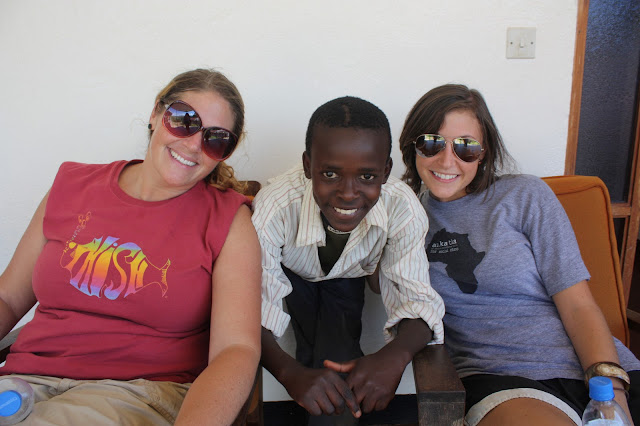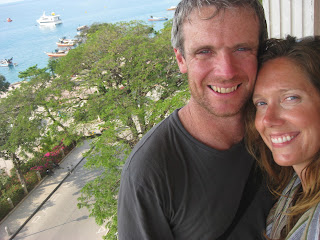Some people rely on months of training to make it to the top of Mt. Kilimanjaro. Some people rely on fierce determination. I had neither...but I somehow made it!
Here are some excerpts from my journal to give you an idea of what it was like.
Day One
I think I pulled a muscle in my thigh. I have a blister on my heel...and I have a hangnail. Why did I sign up for this trip?? I am so out of shape. I was the last person to get to camp...the seven mile hike was really hard for me...especially the last stretch. The altitude gain was 4000 feet and now we're at 9950 feet (only about 10,000 more to go!).
I am blown away by how many porters are on the mountain (10 just for our group of four climbers) and how much they carry on their backs and heads. We have one porter for our toilet tent. His name is KCMC and he carries the portable toilet and its tent all over this mountain. Others carry our bags, tents, food and some trek miles each day to fetch us water. They are amazing.
The forest we hiked through today was so beautiful...very enchanted with lots of ferns, vines and lichens. We saw black & white colobus monkeys in the treetops and turacos close by. Tomorrow's hike is much shorter, but incredibly steep. Rest and recovery. :)
I wish I brought nailclippers.
 |
Porters lining up at Machame Gate
to get their bags weighed. |
Day Two I spent most of the night worrying about having to leave early or be evacuated. The "what ifs" invaded my brain. I was feeling incredibly discouraged last night and worried that leaving might be my only option. If I had so much trouble on the first day, how am I possibly going to make it through this trip? But when I got out of my sleeping bag this morning, my leg felt a little better so I decided to trek on...This time Dean joined me in "Team Pole Pole" (the slow group). Today's hike was even more beautiful than yesterday's. We climbed through a cloud layer and the view was amazing. We were surrounded by the coolest looking plants and trees and flowers...it felt like we were in a Dr. Seuss storybook setting. Made it to Shira Cave Camp by about 2:30. Not bad!
 |
| Day 2 hike...looking down over first camp |
 |
Great way to start the day!
Jeff brought us coffee & tea every morning! |
 |
| Brenda, Robby, Natcho & Dean in our dining room |
Brenda has nailclippers!
Day Three
I made it through another day! The first part of the day was a gradual ascent to 14,900 feet, where we stopped for lunch and caught the beginning of some snowdrops. Despite the cold weather, some porters wore very little...like cotton Tshirts, shorts, and even flip flops! I learned that our porters get paid about $5 a day. This is good money for them, which is why they are here, but it's a very dangerous and difficult job. It's not uncommon for porters to die while on the mountain (usually from altitude sickness) and their job takes a very demanding toll on their bodies. I am constantly in awe of them.
We got moving soon after lunch and headed through what reminded me of the Anza-Borrego in the springtime. Beautiful plants that looked like they belonged in the desert. This is also where I had my first close-up view of the summit glaciers. We got down to Barranco Camp (hike high, sleep low) by about 3:30, just after it started to rain. I changed clothes, snuggled into my sleeping bag and waited for afternoon tea.
I'm adapting very well to high altitude...my oxygen saturation reading tonight was 92 while everyone else was in the 80's (not that this is a competition). Great view of Moshi's lights from our camp. So glad I'm here and not there. :)
Day Four
Stepped outside during the middle of the night and was awestruck by the beautiful view. The clouds had cleared to reveal the summit of Mt. Kilimanjaro, highlighted by the almost full moon. The stars were shining brightly and the constellation Orion was above me.
I heard the Barranco Wall would be one of the most difficult parts of the trip because it's so steep and you need to use your hands to climb it...but I loved it! It wasn't nearly as hard as I expected and the view along the way was spectacular. We made it to Karanga Camp in time for lunch...then Scrabble with the British neighbors...and then a great nap.
 |
| On top of the Barranco Wall. Being a mountaineer! |
Dinner tonight: White rice with ginger beef; potato soup with cilantro and random spices; fritters; veggie sauce. Then we celebrated Natcho's birthday with song, chocolate, and Coca-Cola.
My body is getting tired and my muscles are sore (first time I've used them in awhile!). Tomorrow we hike up to Barafu Camp and then start our ascent to the summit around midnight so we arrive at sunrise. Sounds exhausting!
Day Five
Barafu Camp is really cold and disorganized...and reminds me more of a refugee camp than a high point for mountain climbers. It's snowing and I'm worried it won't stop in time for our ascent. The plan is to head out at 1:00am, reach Stella Point at about 6am, and then hike the 45 minutes to the peak (photo op with sign). It's a full moon tonight, but that means nothing if it's cloudy and snowing. Also, the whole point of getting to the top (for me) is to see sunrise from the top of Africa...but that won't happen if this weather continues. I'm being really negative, I know. I'm grouchy, I know. I need to try to catch a few hours of sleep before we head out.
Day Six
Today was possibly the hardest day of my life. After very little sleep, some tea and snacks, we left camp at 1:00am to start our ascent. I was in a horrible mood and I apologize to anyone on the trail with me because I know I was emitting negative energy. Sorry! I didn't want to go...It was still misting...and it was cold and dark...and I just wanted to stay in my warm sleeping bag. I thought about that sleeping bag the whole way up! There were a few times I wanted to go back to camp, but it just wasn't an option. I wasn't feeling well throughout most of the ascent and wanted to take little breaks, which occassionally turned into "I want to give up" breaks. I didn't have the motivation that so many others on that trail had...and I was cranky. I threw up during one of my breaks (just as my new British friends were passing by), but then felt well enough to continue...slowly. Very slowy. Each step felt like I was moving a ton of bricks and it is a miracle that I made it to the top.
 |
| Full moon over crater rim |
Stella Point was breathtaking (literally). It had an amazing view from all sides...full moon on one side, rising sun on the other, sunken crater, cloud line...it was incredible. I stayed there long enough to welcome Dean (and Andrew), which was one of the greatest moments of the trip. We met up with the others on our way to Uhuru Peak, had tea and a snack while gazing at glaciers, and then continued on to our photoshoot at the summit's sign (which is apparently a must).
 |
| Dean's final steps to Stella Point! |
|
With my "guide" at Stella Point...
Natcho was very patient with me! |
 |
| All sunrises are spectacular...this one was a miracle. |
 |
| Tea time at the top of Africa |
The way down was anti-climatic and slippery and long...but we got back just in time to rest before having to descent again. After a quick nap in the refugee camp, we continued down to Millenium Camp, where we had a great view of the summit and stared at it in amazement. It already seems like so long ago that I was there!
 |
| Start of the long descent down. |
My legs are killing me and my knee hurts and I'm worried about tomorrow's descent.
Day Seven
For the average Mt. Kili climber, it takes about four hours to go down the 12 miles on the Mweka Trail. I am not average. It took me much longer...and then some. I felt physically disabled. I used my hiking poles as canes and could barely bend my left knee. Both of my big toes were swollen and sore. Every step down was incredibly painful (even though I took one of Robbie's magic pain relievers). The rest of the group was ahead and I knew they were waiting for me. I was so frustrated wth my body! I finally made it down to the dirt road, with Natcho as my companion, and had about one more mile to go when I heard the car. Nechi came to rescue me! My original worry of being evacuated actually came true...but it happened when I was off the trail and had only a mile left to go. I LOVED not having to walk that last mile and was so relieved to be "rescued."
 |
| Using my canes to hobble down the mountain |
 |
| The vehicle that rescued me from my last mile! |
Final Thoughts:
I have no desire to climb another major summit.
Porters are supermen.
Our planet is magical.
Sometimes I complain too much.






























































